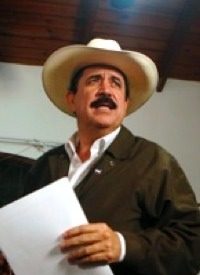
Deposed Honduran President Manuel Zelaya, who was ordered to step down by his nation’s Supreme Court and Congress and forcibly exiled from the country on June 28, has stated his intention to cross the Nicaraguan-Honduran border on July 24.
Zelaya made his statement during a July 22 news conference from Nicaragua, where he has been the guest of Nicaraguan president and former communist Sandinista guerilla leader Daniel Ortega.
The exiled former president’s spokeman, Allan Fajardo, told the Associated Press that Zelaya would set up base in the northern Nicaraguan city of Esteli while working out the details of his attempted reentry into Honduras. He said that Zelaya would be accompanied by family, journalists, and Honduran supporters. "I will go back unarmed, pacifically so that Honduras can return to peace and tranquility," said Zelaya. "My wife and kids will accompany me, and the military will be responsible for any harm."
Lorena Calix, a spokeswoman for Honduras’s national police, said on July 23 that police officers were prepared to detain Zelaya. "When he comes to Honduras, we have to execute the arrest warrant," she said.
The nation’s Supreme Court had ordered Zelaya’s arrest prior to his removal from office, ruling that his attempt to hold a referendum on extending his term of office was both illegal and unconstitutional. After the military sent Zelya into exile, the congress elected Roberto Micheletti, president of the congress, to fill the remainder of Zelaya’s term in office, which ends in January. A presidential election will be held, as scheduled, in November.
AFP reported that Zelaya’s choice of Nicaragua as a base to enter Honduras might inflame regional tensions. Micheletti has accused leftist governments in Nicaragua, Venezuela, and Ecuador of fomenting tension in his country, suggesting that there were plots to escalate the crisis into a military conflict.
On July 5, the last time Zelaya attempted to return to Honduras, aboard a plane provided by Venezuela’s Marxist strongman Hugo Chavez, the landing at the Honduran capital of Tegucigalpa was thwarted when the airport runway was blocked by military vehicles. The plane instead took Zelaya to Nicaragua.
Costa Rican President Oscar Arias has presented a plan that, while purporting to offer a compromise to settle the dispute between supporters of Zelaya and Micheletti, is blatantly one-sided in demanding Zelaya’ reinstatement. The Micheletti administration refuses to consider such a plan and Foreign Minister Carlos Lopez insisted that the executive branch cannot overturn a Supreme Court ruling forbidding the reinstatement of the ousted leader. "A proposal of that nature is inconceivable, unacceptable," Lopez told Radio America.
Reuters news quoted Mauricio Villeda, a Micheletti administration government negotiator at the Arias-brokered talks, who said: "I don’t think the Supreme Court or the state prosecutor’s office or Congress are going to change their criteria. I think they will maintain their position against Manuel Zelaya’s return to power."
Despite the unanimous agreement among Honduras’s executive, legislative, and judicial branches, most of the world’s news media and government leaders have insisted upon referring to the change in government in Honduras as a "coup."
Valentin Suarez, the head of Honduras’s ruling Liberal Party in congress — the same party to which Zelaya belongs — said most legislators would vote against the plan proposed by Arias.
"The executive branch, the judiciary, and congress can’t all be wrong," Suarez said. "[The Arias plan] is a crazy recommendation for Hondurans."
Articles about Arias’s role in negotiating a plan that would restore Zelaya to power in Honduras often mention that he won the Nobel Peace Prize in 1987 for helping to negotiate the end of conflicts in Central America. What is rarely mentioned, however, is that the "peace plan" for which he was awarded that prize (the "Procedure for the Establishment of a Strong and Lasting Peace in Central America") called for an end to U.S. support for the anti-communist Contras, but neglected to counter the massive Soviet aid that propped up the communist Sandinista regime of Daniel Ortega in Nicaragua.
As we have seen, Ortega is still around, though he has cleaned up his image and claims to have left his radical Sandinista ways behind him. It is not surprising that he has made Zelaya feel right at home in Nicaragua.
Arias suggested that the Organization of American States (OAS) take over the negotiations if no agreement is reached, the BCC reported. The network’s correspondent noted that such a move "might put further pressure on the interim government" of Roberto Micheeletti.
Which would only add one more stone to the pile that has been placed on Honduras to force it to capitulate to the demands of the internationalist-style leaders zemanding the return of Zelaya, whom even the New York Times has described as "a leftist aligned with President Hugo Chávez of Venezuela."
As we have seen, Arias, a one-time apologist for Sandinista leader Daniel Ortega, has suggested passing the ball to the OAS. Miguel Insulza , the secretary-general of the OAS, has described Zelaya’s removal as an "old-fashioned coup," and said: "We need to show clearly that military coups will not be accepted. We thought we were in an era when military coups were no longer possible in this hemisphere."
However, Insulza also has a decidedly Lefitist background. As a Chilean socialist, he was once political advisor to the Chilean Ministry of Foreign Affairs under the regime of the communist Salvador Allende. His political career was interrupted with the demise of the Chilean Socialist Party under General Agosto Pinochet — who took control of Chile as Allende was about to consolidate his power and turn the nation into a Cuban-style communist dictatorship — and he went into exile in Mexico from 1981 to 1988.
Among other stones added to the pile to add pressure to Honduras: this week, the European Union suspended 65.5 million euros (93 million dollars) in aid to Honduran institutions as part of an international aid freeze.
Even the Chinese People’s Daily (the organ of the Central Committee of the Communist Party of China), has given a voice to Honduran opposition National Party’s presidential candidate Porfirio Lobo’s complaint that the decision from many countries to suspend their aid to Honduras is "unfair." The Chinese newspaper reported:
After the coup, Honduras was expelled from the Organization of American States (OAS), and lost its access to loans and credits from the Inter-American Development Bank and the Central American Bank for Economic Integration.
The World Bank also suspended 270 million U.S. dollars of funds to Honduras, while the United States said it will suspend aid programs to Honduras ranging from military, basic education and environment to family control.
While the Communist Party of China can certainly be counted on to see eye-to-eye with the many Latin American leftists who have reached out to Zelaya, the Chinese communists apparently feel compelled to feign a sense of compassion for the poor people of Honduras.
Which is more than can be said for the EU, the OAS, and the World Bank.
Photo of Manuel Zelaya: AP Images



